
A Licensing Inspector enforces regulatory compliance by examining business operations and verifying adherence to licensing laws and safety standards. Responsibilities include reviewing applications, conducting site inspections, and documenting violations to ensure public safety and legal conformity. Proficiency in local government regulations, investigative skills, and clear communication is essential for effective licensing enforcement.
Individuals with strong attention to detail and an ability to remain objective under pressure are likely suitable for a Licensing Inspector role. Those who thrive in environments requiring consistent rule enforcement and clear communication may find this job aligns well with their skills. Conversely, people who struggle with conflict or lack patience might encounter challenges in performing effectively as a Licensing Inspector.
Qualification
Licensing Inspectors typically require a high school diploma or equivalent, with many employers preferring candidates holding an associate degree or certification in public administration, business, or a related field. Strong knowledge of local, state, and federal licensing regulations and the ability to interpret legal documents are essential qualifications. Effective communication skills, attention to detail, and experience in inspection or compliance roles significantly enhance job performance and career advancement.
Responsibility
A Licensing Inspector is responsible for reviewing applications, verifying documentation, and ensuring compliance with local, state, and federal regulations to grant or deny licenses. They conduct thorough investigations and site inspections to assess eligibility and adherence to legal standards. Maintaining accurate records and providing detailed reports are essential to uphold regulatory integrity and public safety.
Benefit
Licensing Inspector roles likely offer benefits such as comprehensive health coverage, retirement plans, and paid time off to ensure employee well-being. Employees may have access to professional development opportunities, enhancing skills and career advancement prospects. The position probably provides a stable work environment with consistent hours and community engagement.
Challenge
A Licensing Inspector role likely presents challenges involving meticulous attention to regulatory compliance and the ability to interpret complex legal documentation. The position probably demands balancing thorough inspections with efficient time management, ensuring that all licenses meet established standards without unnecessary delays. Navigating conflicting stakeholder interests and adapting to evolving laws may also contribute to the job's complexity.
Career Advancement
A Licensing Inspector plays a critical role in ensuring compliance with regulatory standards across various industries, providing a strong foundation for career advancement into senior regulatory or compliance management positions. Mastery of local, state, and federal licensing laws enhances opportunities to progress into specialized roles such as Licensing Manager, Compliance Officer, or Regulatory Affairs Specialist. Continuous professional development and certification in regulatory practices significantly increase prospects for leadership and higher earning potential in the field.
Key Terms
Audit Reports
Licensing Inspectors conduct thorough reviews and verify compliance through detailed audit reports that document findings and regulatory adherence. These reports are critical for identifying potential violations, ensuring licenses meet legal standards, and supporting enforcement actions. Accurate and comprehensive audit documentation strengthens transparency and accountability within licensing processes.
Permit Verification
Licensing Inspectors specializing in permit verification ensure compliance with local, state, and federal regulations by meticulously reviewing permits for building, business operations, and specialized activities. They analyze documentation to confirm validity, monitor expiration dates, and identify any discrepancies that could lead to legal or safety issues. Their expertise supports regulatory agencies in enforcing standards and protecting public welfare through accurate permit management and verification processes.
Enforcement Actions
Licensing Inspectors play a critical role in ensuring compliance by conducting thorough investigations and initiating enforcement actions against violations of licensing regulations. They assess licensee adherence to legal standards, issue warnings, impose fines, and recommend license suspensions or revocations to maintain public safety and regulatory integrity. Their enforcement actions are essential in preventing unlicensed operations and safeguarding consumer interests within regulated industries.
 kuljobs.com
kuljobs.com